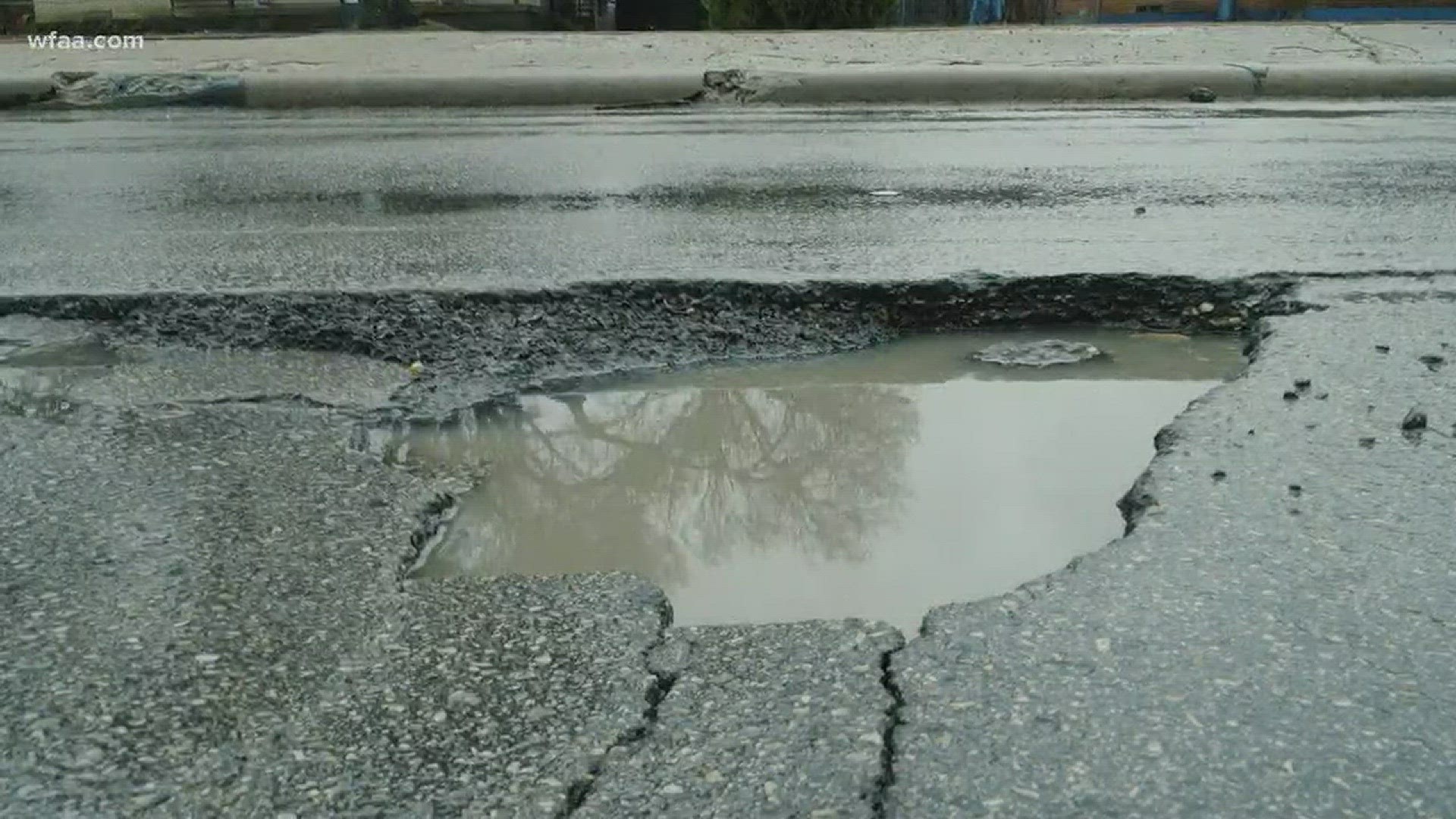Rain is great for the flowers but terrible for blacktop. Heavy Spring rain can seep down into pavement. That leads to potholes.
There are so many potholes, in cities across America, and a limited amount of money to fix them. What I want to know is if it’s possible for us to solve the pothole problem.
City Streets
To see pothole repair in action, I hooked up a road crew with the City of Dallas. Their truck carries hot, molten asphalt that hardens as it cools.
The City of Dallas says it spends $63 million a year on street repair, which includes fixing potholes.
To learn more I’m interviewing Tina Richardson, interim director of Public Works for Dallas.
“We have 11,770 lane miles of road. And everyone has potholes in it,” she tells me.
“Is it possible to live in a world where there are no potholes?” I ask.
“I don't know,” Richardson says. “If you have an area where it doesn't rain a lot, they probably don't have a lot of potholes. But this isn't that area,” she says.
There are so many potholes but, she says, only so many people to fill them. In a year, Dallas can fill as many as 38,000 potholes. And every year they keep coming back.
“Why are there so many potholes?” I ask.
“We have aging infrastructure,” Richardson says.
Better Technology
So that's the problem. Now I want to see, is there a solution?
I’m on the campus of Texas A&M at the 80-million dollar Center for Infrastructure Renewal. It’s dedicated to the idea that our nation's infrastructure -- roads, bridges, pipelines -- is in desperate need of repair. That includes potholes.
Professor Zach Grasley is the Ph.D. engineer who runs the place.
“Can you envision a day where potholes are no longer a problem?” I ask him.
“Sure. Absolutely,” Grasley says.
“Like Wednesday or Thursday?” I ask.
“How much money do you have?” he answers.
“There are signs that develop internally leading up to you developing a failure, like a chunk of material coming out of your roadway. If you know, in advance, this thing is getting close. You can stick a band-aid on it,” Grasley tells me.
Grasley envisions a day where trucks, armed with sensors, can look inside the pavement and detect early signs of decay then make fixes before potholes happen. Or a vehicle that hits a pothole could immediately report the problem, so a crew can come fix it.
“Are potholes a problem or a symptom of a problem?” I ask Grasley.
“They are a symptom of a problem. They are a problem if your car hits it. To us, as researchers, they are a symptom of a material that is not lasting as long as we would like it to,” he answers.
Better Materials
So better materials can make longer-lasting roads. So, I'm making a bunch of text asphalt with lab tech Rick Canatella. And it's just two ingredients. Rocks and an oil-based binder to hold them together.
The trick is finding the right mixture from a limitless number of combinations.
“Coming up with new varieties of asphalt is as simple as two ingredients? It's the rock and it's the binder? So it's different kinds of rocks and sizes?” I ask Canatella.
“And different kinds of binders, different grades of binders,” he says.
Samples like these are then tested by Edith Arambula Mercado, a PhD Materials Engineer designing longer-lasting pavement. She tests them under a range of conditions and temperatures to see how they hold up.
She can even tailor make mixtures according to different climates across the country.
“It's a combination of selecting the right materials and how they blend together to have good performance,” she tells me.
“Are potholes a problem that can be solved,” I ask.
“I think so yes. I think the engineering is there to prove that we can do very long-lasting pavements,” she says.
Conclusion
So, what is the answer? Can we solve the pothole problem?
A lot of smart people at Texas A&M think so. But even if they do develop better materials and technology, we'd still have to repave all our streets.
So, in the real world, at least for now, we're not solving this problem.
Got something you want verified, send me an email: david@verifytv.com

